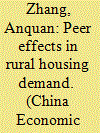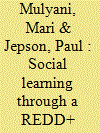|
|
|
Sort Order |
|
|
|
Items / Page
|
|
|
|
|
|
|
| Srl | Item |
| 1 |
ID:
144926


|
|
|
|
|
| Summary/Abstract |
The present study applies Social Learning (Differential Association) Theory to the explanation of political violence, focusing on exposure to extremist content through new social media (NSM) and controlling for key variables derived from rival theories. Data are gathered using (a) a paper-and-pencil study among high school students, and (b) a web survey targeting youths between 16 and 24 years old. A total of 6020 respondents form the dataset. Binary logistic regression is used to analyze the data. Results show that even when controlling for background variables, strain variables, personality characteristics, moral values, and peer influences, the statistical association between measures of extremism through NSM (ENSM) and self-reported political violence remains significant and fairly constant. The most persistent effects are found for those measures where individuals actively seek out extremist content on the Internet, as opposed to passive and accidental encounters using NSM. Furthermore, offline differential associations with racist and delinquent peers are also strongly and directly related to self-reported political violence, as are some mechanisms from rival perspectives. This indicates that political violence can only partially be explained by social learning and suggests that the impact of ENSM is mediated by real-world associations and that the offline world has to be taken into account.
|
|
|
|
|
|
|
|
|
|
|
|
|
|
|
|
| 2 |
ID:
032086


|
|
|
|
|
| Publication |
New Yark, The Free press, 1971.
|
| Description |
XIII, 332p
|
|
|
|
|
|
|
|
|
|
|
|
Copies: C:1/I:0,R:0,Q:0
Circulation
| Accession# | Call# | Current Location | Status | Policy | Location |
| 008071 | 150/MCL 008071 | Main | On Shelf | General | |
|
|
|
|
| 3 |
ID:
171722


|
|
|
|
|
| Summary/Abstract |
The rural pension system, co-financed by rural residents' contributions and government subsidies, is a remarkable institutional innovation in China. To better understand the establishment and policy design of this system, this article studies the local experimentation of (partly) government-funded new rural pension schemes prior to the national policy guideline issued in 2009. The focus is on the role of social learning as a crucial driving force in this process. Through a process tracing based on in-depth interviews in Daxing of Beijing and Baoji of Shaanxi Province, this article illustrates how local governments struggled to find suitable financing models for rural pensions, and relied primarily on hands-on experimentation and experiences. During the mobilization of participation in the schemes, the repeated and constant interactions between local officials and rural residents promoted a form of mutual learning that contributed to local policy adaptation and rural residents' internalization of the value and basic rules of contributory pension provision. The local experience had a cumulative impact on the ideational reorientation of the central officials regarding the state's financial role in provision. Specifically, the financing model in Baoji created new options that facilitated the reconciliation of a set of different concerns and objectives at the centre, notably fiscal affordability, wide coverage, and modest managerial burden, which, this article argues, was the major reason for the incorporation of this model into the national policy. The article concludes by discussing the implications of the establishment of the rural pension system and its provisions on rural state-society relations in China.
|
|
|
|
|
|
|
|
|
|
|
|
|
|
|
|
| 4 |
ID:
186449


|
|
|
|
|
| Summary/Abstract |
Effective regulation is critical to advancing electricity retail market reforms to incentivize electricity quality improvements of retail electricity suppliers (REPs) and promote consumer market participation. In addition, with the development of social media, consumer feedback (CF) and social learning (SL) have become more accessible and frequent. However, there is still a research gap on how regulator can use these feedbacks as an aid to optimize dynamic regulation. Therefore, we construct dynamic Stackelberg game and consumer social network models with incomplete information, where the regulator optimizes its strategy to improve regulatory efficiency, and REPs determine electricity product quality to maximize profits. Customers integrate information in social networks to update purchase decisions and provide information feedback, affecting the profits and regulatory, respectively. This paper analyzes the optimal strategy and equilibrium in a variety of scenarios through simulation, and the main conclusions are as follows:(i) CF and SL motivate regulator to play an extremely active role and REPs to focus on continuous improvement of electricity quality. (ii) CF and SL can effectively increase market dynamics, improve regulatory efficiency, enhance social welfare, and curb market blindness. This paper provides decision support for regulator on how to improve regulatory efficiency and use consumer regulation.
|
|
|
|
|
|
|
|
|
|
|
|
|
|
|
|
| 5 |
ID:
187861


|
|
|
|
|
| Summary/Abstract |
This paper utilizes data from the China Household Finance Survey 2011 to study peer effects in housing demand in rural China. We find that focal households' housing consumption is heavily influenced by peer households' housing consumption. Evidence from placebo tests, IV estimates and robust tests suggests that the relationship is causal. In addition, we show that status seeking and social learning play important roles in determining peer effects in the demand for rural houses. Finally, we explore the heterogeneity in peer effects and determine that the leading mechanism is status seeking.
|
|
|
|
|
|
|
|
|
|
|
|
|
|
|
|
| 6 |
ID:
179982


|
|
|
|
|
| Summary/Abstract |
Although recent years have seen a great increase in the study of hate crime and terrorism, there is limited research to date that explores connections between hate crime and terrorism. This study uses a qualitative case-study method to explore the competing criminological theories of social learning and social control to investigate their utility in explaining radicalization among hate and terrorist violent extremists. Our analysis demonstrates important similarities and differences across ideology and offender types in their career pathways. We find support for the use of an integrated social control–social learning model to explain radicalization and the commission of extremist violence.
|
|
|
|
|
|
|
|
|
|
|
|
|
|
|
|
| 7 |
ID:
138259


|
|
|
|
|
| Summary/Abstract |
This paper examines the process for establishing a ‘village agreement’ using the Kalimantan Forests and Climate Partnership (KFCP) as a case study. REDD+ is designed as a ‘performance-based’ mechanism and requires a contractual agreement between the parties involved. Since its implementation will affect the life of forest-dependent communities, it is vital that villagers have sufficient ability to negotiate their interests during the agreement process. This paper investigates the degree of ‘social learning’ essential for developing actors' capacity to negotiate rules and interests with outsiders involved in the agreement process (between KFCP and the seven villages involved) and how this meshes with notions of ‘participation’. It found that while ‘social learning’ occurred as a result of the well-designed participatory process conducted by KFCP, villagers' ability to secure their interests was influenced by a learning experience accumulated from their previous engagement with several development/conservation projects. This finding contributes to literature by emphasising how historical context plays a significant role in the success of present learning and the efficacy or otherwise of a contractual agreement. Therefore historical aspects should be taken into account in site selection and the design of future REDD+ projects.
|
|
|
|
|
|
|
|
|
|
|
|
|
|
|
|
| 8 |
ID:
159483


|
|
|
|
|
| Summary/Abstract |
Why do bad policy ideas persist over time? We trace the development of the euro’s governing ideas over fiscal and monetary policy in the face of mounting evidence that continued adherence to those ideas was economically deleterious. We argue that a specific form of social learning, framed by a retrospective recoding in 2010–2012 of Europe’s experience with fiscal rules in 2003–2005, drove European elites to pursue policies that were economically irrational but politically rational. As a result, the Eurozone’s medium-term resilience has been made possible by the European Central Bank’s unconventional and loose monetary policies, which operate in direct opposition to the tight fiscal policies of its member states’ governments. We maintain that this self-defeating macroeconomic policy mix will continue as long as the lessons learned by policymakers are driven by the need to win what we term an authority contest, rather than provide better macroeconomic outcomes.
|
|
|
|
|
|
|
|
|
|
|
|
|
|
|
|
|
|
|
|
|